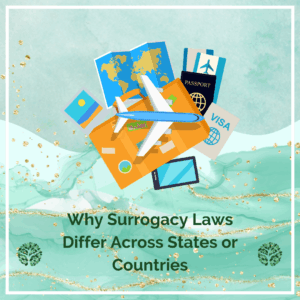
Surrogacy is a path filled with hope, love, and anticipation. However, it’s also one of the most complex areas of family building in terms of legal rules. If you’ve ever researched surrogacy, you’ve probably noticed that laws differ dramatically depending on where you live. Some states or countries welcome surrogacy with clear protections, while others restrict it heavily or prohibit it altogether. But why is that the case? Let’s break it down.
The Role of Local Culture and Values
Cultural attitudes shape laws. In some places, surrogacy is embraced as a modern solution to infertility and family building. In others, cultural or religious traditions view surrogacy as ethically complicated, which can lead to stricter regulations or bans.
Legal Frameworks and Precedents
Unlike adoption or other family-building options, surrogacy laws are relatively new. This means that many regions are still figuring out how to handle parentage, contracts, and rights. Some states have established clear legal pathways that recognize intended parents from the start, while others rely on older laws that don’t account for assisted reproduction. This can be a tricky subject to navigate on your own, and it can be incredibly beneficial to seek help from an agency.
Concerns About Exploitation and Ethics
In countries where surrogacy is tightly controlled, lawmakers often cite concerns about protecting women from exploitation. Some regions only allow altruistic surrogacy (where the surrogate is reimbursed for expenses but not compensated beyond that), while others permit compensated surrogacy with strict oversight.
Differences in Parental Recognition
One of the biggest reasons laws vary is the question of parentage: who is legally recognized as the child’s parent at birth? Some jurisdictions automatically list the surrogate on the birth certificate, requiring legal steps later for the intended parents. Others issue pre-birth orders or have streamlined procedures that recognize the intended parents from day one.
What This Means for Intended Parents and Surrogates
- Do your research early: Laws may affect where you can pursue surrogacy safely.
- Work with experienced professionals: Agencies, lawyers, and clinics can guide you through your state or country’s process.
- Stay flexible: Sometimes, intended parents travel across state lines (or even internationally) to complete their journey.
Conclusion
Surrogacy laws differ not because the journey itself changes, but because each place has its own cultural values, history, and legal priorities. Understanding these differences is key to protecting everyone involved and making sure your surrogacy story starts on the proper legal foundation. Family Choice Surrogacy only works with surrogates who reside in the United States in surrogacy-friendly states. This allows for the best protection for both the intended parents and surrogates.
